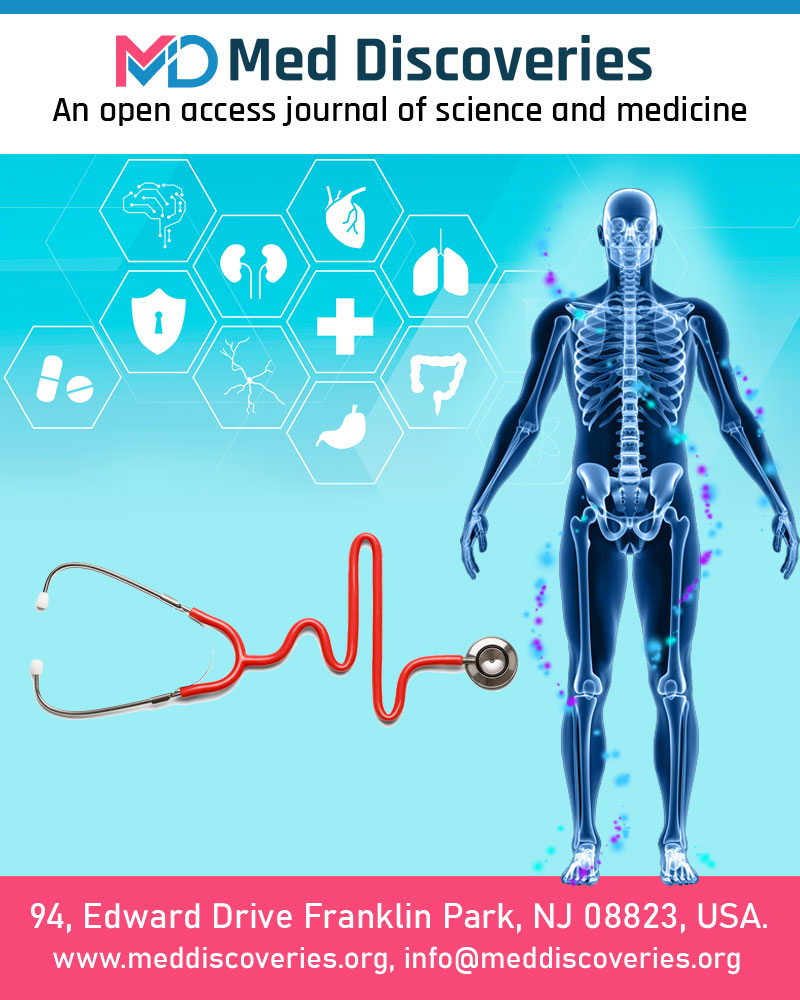Case Report
Volume 2, Issue 10
Paroxysmal Throbbing Pain Precipitated by Swallowing, Followed by Syncope, are Fatal Processes of Glossopharyngeal Neuralgia
Hai-Ping Xia1; Biao Jin1; Hui Zhou2; Cen Su2; Kang-Ren Zhao1; Shao-Xia Dong1; Rui Ma2*
1Zhenjiang 4th People’s Hospital Affiliated to Jiangsu University, Jiangsu 212000, China.
2Medical School, Jiangsu University, Jiangsu 212000, China.
Corresponding Author :
Rui Ma
Email: jsnjmr@163.com
Received : Sep 22, 2023 Accepted : Oct 09, 2023 Published : Oct 16, 2023 Archived : www.meddiscoveries.org
Citation: Xia HP, Jin B, Zhou H, Su C, Ma R, et al. Paroxysmal Throbbing Pain Precipitated by Swallowing, Followed by Syncope, are Fatal Processes of Glossopharyngeal Neuralgia. Med Discoveries. 2023; 2(10): 1081.
Copyright: © 2023 Ma R. This is an open access article distributed under the Creative Commons Attribution License, which permits unrestricted use, distribution, and reproduction in any medium, provided the original work is properly cited.
Abstract
Glossopharyngeal neuralgia is not a simple disease with just sensory neurodynia, which could be followed by fatal cardiac syncope. We report a rare case, female, 46-year-old, married, paroxysmal throbbing pain in right auricle for 5 year, followed by syncope for 10 days. The patient fell down unconsciously, during cardiac syncope. ECG shows abnormal cardiac rhythm, low heart rate, followed by blood pressure. According to the condition, artificial pacemaker was applied to the patient, and Microvascular Decompression (MVD) is needed.
Keywords: Case report; Glossopharyngeal neuralgia; Microvascular decompression; Syncope; Vagoglossopharyngeal neuralgia.
Introduction
Glossopharyngeal neuralgia is not a simple disease with just afferent problem, which could be followed by fatal cardiac syncope [1-4]. A lady, 46-year-old, married, paroxysmal throbbing pain in right auricle for 5 year, followed by syncope for 10 days, was admitted to the Department of Neurology, Zhenjiang Fourth People’s Hospital.
The patient suffered from pharngalgia, and followed by otalgia for five years, and then she developed shooting pains in right auricle elicited by swallowing, followed by syncope for 10 days. Every attacks lasted about 2 to 3 minutes before the pain subsided. Five years ago, she was diagnosed with glossopharyngeal neuralgia in the Affiliated Hospital of Jiangsu University and received carbamazepine every day, and the drug could control the onset of pain. She suffered from right throbbing otalgia every year during January to March, and did not subject during the rest of the year. Twenty days ago, the patient suffered a severe onset of right throbbing otalgia and severe dizziness, fell unconscious and syncope every half hour. She was sent to our hospital to consult. She was diagnosed with neurodynia and syncope [5] (Table 1).
During the patient’s hospitalization, the patient suffer otalgia in the right auricle, with 2 episodes of falling down unconsciousness, foaming at the mouth, closed eyes, and closed teeth. At that time, the pupils on both sides were dilated, with a diameter of 4 mm and delayed light reflex. The blood pressure was 84/46 mmHg, and the heart rate was about 45/minute, lasting for about 30 seconds. After the consciousness recover, the blood pressure increased to 111/70 mmHg, and the heart rate increased to about 77/minute. According to bedside electrocardiogram monitoring, the patient’s heart rate and blood pressure decrease every time they experience otalgia in right auricle. After the right auricle pain improves, their heart rate and blood pressure can rise (Figure 1). ECG shows abnormal cardiac rhythm, low heart rate, followed by blood pressure [6].
The glossopharyngeal nerve is different from trigeminal nerve, which has Special Visceral Afferent fibers (SVA): Sensory nerve to carotid sinus, a baroreceptor, and can cause reflexion to suppress the cardiovascular movements. The mechanism of the syncope is believed has close relation with the carotid sinus reflexion, which decreases the blood pressure and heart rate, even abnormal cardiac rhythm and syncope. According to the condition, artificial pacemaker was applied to the patient, and Microvascular Decompression (MVD) is needed.
Table 1: To confirm to the diagnostic criteria for classical glossopharyngeal neuralgia.
| Diagnostic criteria | This case | Confirm | |
|---|---|---|---|
| A. | Paroxysmal attacks of facial pain lasting from a fraction of a second to 2 min and fulfilling criteria | Paroxysmal attacks of otalgia lasting 2-3 min | Yes |
| B. | Pain has all of the following characteristics: | Yes | |
| 1 | Unilateral location | Only in right side | Yes |
| 2 |
Distribution within the
posterior part of the tongue,
tonsillar fossa, pharynx or
beneath the angle of the lower jaw and/or in the ear |
Distribution in pharynx and auricle | Yes |
| 3 | Sharp, stabbing and severe | Stabbing or shooting pain | Yes |
| 4 | Precipitated by swallowing, chewing, talking, coughing and/or yawning | Induced by swallowing | Yes |
| C. | Attacks are stereotyped in the individual patient | Concurrency are regular | Yes |
| D. | There is no clinically evident neurological deficit | No abnormal finding in nervous system. | Yes |
| E. | Not attributed to another disorder | Not related attributed finds | Yes |
References
- Blumenfeld A, Nikolskaya G. Glossopharyngeal neuralgia. Curr Pain Headache Rep. 2013; 17: 343.
- Nakamura S, Shimizu T, Tsuneoka H, et al. Glossopharyngeal neuralgia with repeated cardiac syncope: A case report. Surg Neurol Int. 2023; 14: 208.
- Marques A, Caldeira D, Alegria S, Pereira AR, João I, et al. Glossopharyngeal neuralgia with cardioinhibitory syncope: Is a permanent pacemaker required? Rev Port Cardiol. 2023; 42: 805-809.
- Wu L, Xiong J, Huang Y, Han K, Cai K, et al. Case report: Trigeminal neuralgia misdiagnosed as glossopharyngeal neuralgia. Front Neurol. 2023; 14: 1079914.
- Headache Classification Subcommittee of the International Headache Society. The International Classification of Headache Disorders: 2nd edition. Cephalalgia. 2004; 24: 9-160.
- Park JS, Ahn YH. Glossopharyngeal Neuralgia. J Korean Neurosurg Soc. 2023; 66: 12-23.


